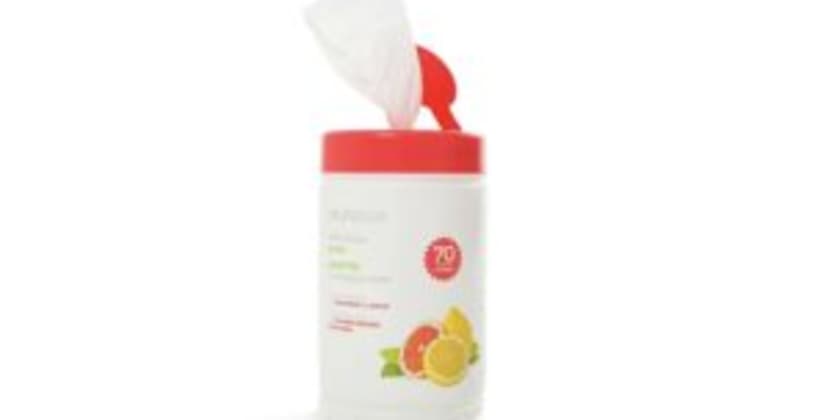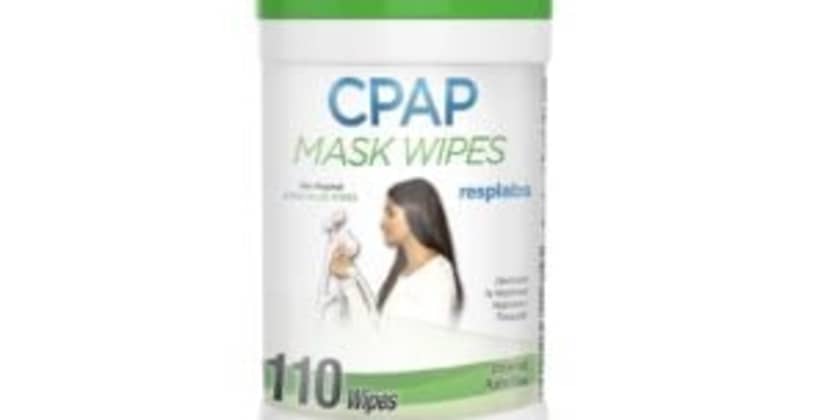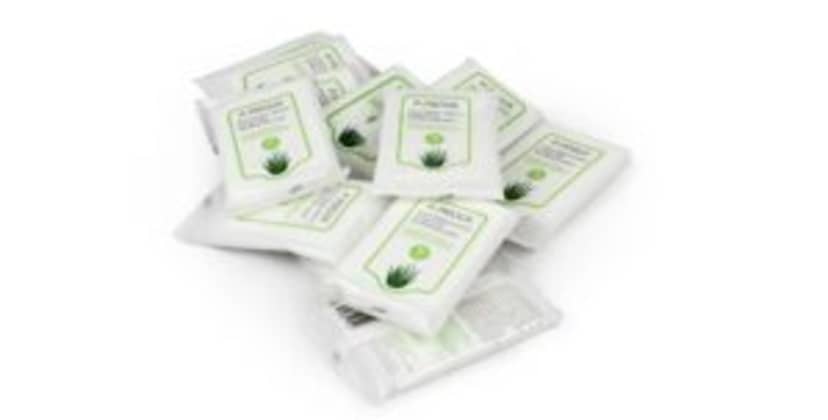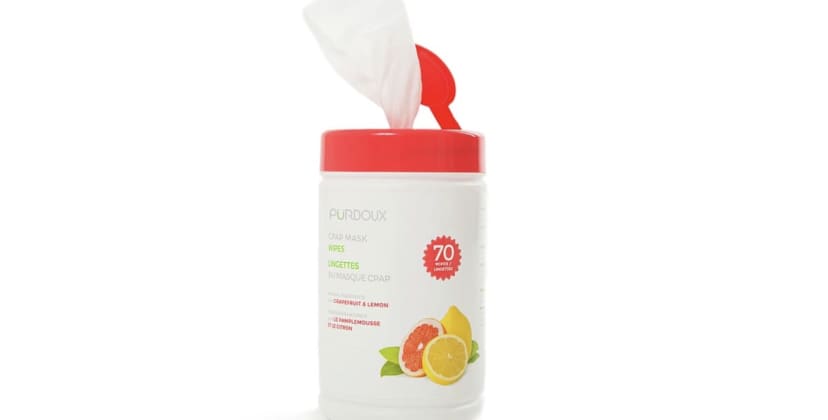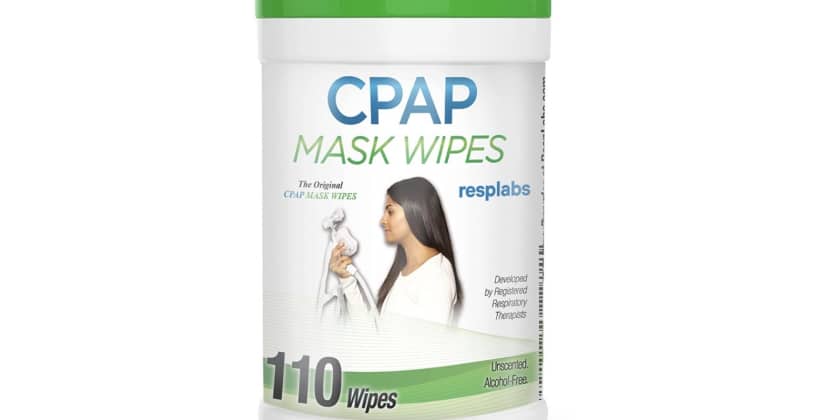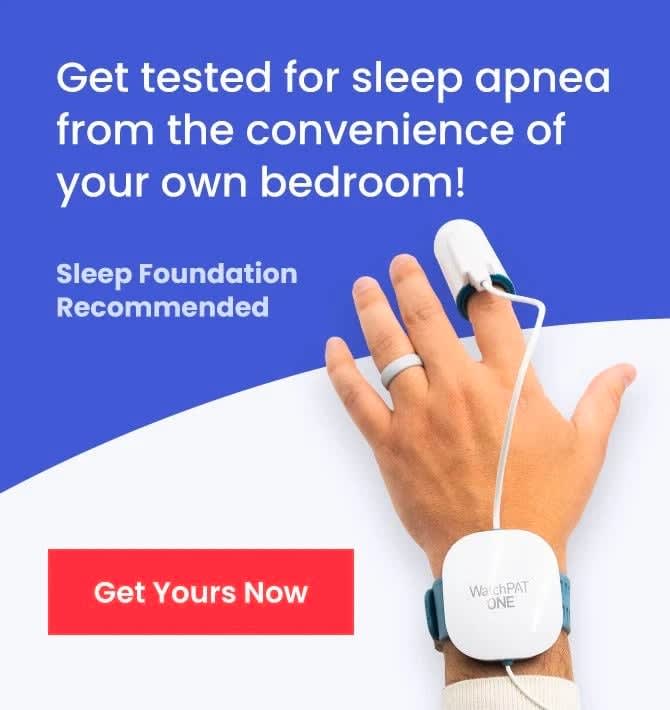When you buy through our links, we may earn a commission. Products or services may be offered by an affiliated entity. Learn more.
Best CPAP Wipes of 2026
Continuous positive airway pressure (CPAP) machines help people with sleep apnea by delivering pressurized air to keep their breathing passages open and functioning while they sleep. Using a CPAP machine can prevent sleep apnea symptoms, but it may require some bedtime routine adjustments.
One of the most important aspects of owning a CPAP machine is caring for it properly. A well-functioning machine and a mask that fits your preferred sleeping position can increase your overall quality of life.
On the other hand, a CPAP machine that is dirty or clogged can cause irritation and even illness. It’s critical to regularly clean your CPAP machine and replace the filter. If possible, you should clean your CPAP mask and hose daily with soap and water to maintain effective treatment.
CPAP wipes can make cleaning your mask and other CPAP components easier. We’ll take a deep dive into CPAP wipes, discussing their functions, ingredients, and average cost. We’ll help you learn what’s best for your individual needs and teach you what to look for in a product, including which ingredients you should avoid. We’ll also share our top picks for CPAP cleaning wipes.
In-Depth Reviews
Who it’s best for
Those who prefer using wipes that are free of alcohol and solvents
People seeking wipes that are easy on the skin
Value seekers
Highlights
Each wipe composed of highly absorbent cotton
Scented with natural citrus
Subscribers save 15% on their purchase
Price
$11
CPAP accessories often take a backseat to more products like machines and masks, but you can optimize your therapy experience by putting extra thought into ancillary items. Take the Purdoux CPAP Mask Wipes, which are made from naturally absorbent cotton and do not contain alcohol or solvents.
Natural grapefruit and lemon juice creates a pleasant scent, and the wipes shouldn’t irritate your skin — even if you’re in the midst of heavy-duty cleaning. Each shipment contains 70 individual wipes. A secure top locks in the moisture, so you can count on a fresh wipe with each cleaning.
The Purdoux CPAP Mask Wipes are affordably priced, and those who register for a subscription with Sleep Doctor receive a 15% discount on their purchase. All U.S. customers qualify for reasonable flat-rate shipping with their order. Unopened containers may be returned within 60 days of purchase.
Who it’s best for
People who are sensitive to the smell of rubbing alcohol
Those who clean their CPAP mask on a daily basis
Value seekers
Highlights
Wipes are unscented and alcohol-free
Compatible with all CPAP, BiPAP, and APAP masks
Discounts available for those who order multiple containers
Face mask wipes are generally inexpensive compared to other CPAP accessories, but shoppers with tight budgets can still save a bundle if they opt for the RespLabs CPAP Wipes. Standard packs of 110 wipes are widely available for less than $10, and you can save even more if you purchase multiple containers. This bang for your buck is ideal if you prioritize cleaning your CPAP mask every day.
The wipes are unscented and do not contain any alcohol, so you shouldn’t experience any discomfort if you’re sensitive to harsh smells. Each wipe should be used once and then discarded. With proper application, you should be able to remove all grime and debris from your mask in less than a minute. The wipes are compatible with virtually any CPAP mask on the market today.
If you are an Amazon Prime subscriber and purchase the RespLabs CPAP Wipes from Amazon.com, you’ll qualify for additional savings on delivery fees.
Best for Travel
Purdoux CPAP Mask Travel Wipes
Use this SleepFoundation.org link for the most current discount on Purdoux products
Shop Now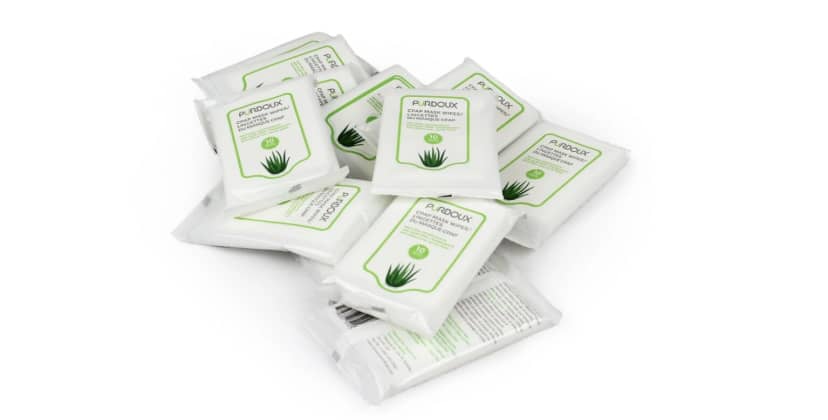
Who it’s best for
People with sensitive skin
Those who prefer to travel with CPAP equipment
Anyone who enjoys the smell of aloe vera
Highlights
Absorbent cotton wipe does not contain alcohol or other solvents
120 wipes included in each order
Aloe vera adds extra softness
Traveling with mask wipes and other CPAP accessories can be a pain because these items can accumulate and take up quite a bit of luggage space. Purdoux’s CPAP Mask Travel Wipes are conveniently packaged for on-the-go convenience. Your order includes 12 sealed packages, each containing 10 individual wipes. The packages are compact, so you can pack as many as you need for the duration of your trip.
The unscented, exceptionally absorbent pads are composed of 100% cotton and softened with aloe vera. They do not contain alcohol or other solvents, so they’re easy on your skin and glide smoothly over silicone surfaces like those found on your CPAP mask. These pads are not reusable. Simply dispose of each wipe after one use.
At just over 10 cents per pad, these travel wipes offer great value if you’re planning a lengthy trip. Sleep Doctor also offers reasonable flat-rate shipping for customers within the contiguous U.S. The Purdoux CPAP Mask Travel Wipes are not returnable once opened.
Why You Should Trust Us
Our team of experts at Sleep Foundation has years of experience testing many different types of sleep products, from mattresses and bedding to CPAP machines and accessories. We examine each product in our dedicated sleep lab and rate them using a series of rigorous performance metrics.
Testing CPAP-related products requires particular care since they're used for medical purposes. Our experts determine how well these accessories perform and take an in-depth look at their value and durability. While our performance testing is comprehensive, your physician is still your best resource when choosing between CPAP devices. You should also consult your doctor on any health-specific questions.
Are CPAP Wipes Useful?
CPAP wipes can be useful when paired with a regular mask cleaning regimen. Whether you use a full-face mask, a nasal mask, or any other design, the right CPAP wipes can make cleaning your mask and accessories easier. While you’ll still need to regularly clean your CPAP machine using soap and water, CPAP wipes can easily remove dirt, oil, and other organic materials without the need to scrub.
Though CPAP wipes often cost more than general-purpose or baby wipes, they are specifically designed for use on your CPAP mask. This is important, because a wipe containing alcohol or other harsh chemicals may leave behind a residue that could irritate your skin or airways. Using CPAP-specific wipes is an excellent way to ensure that your mask stays free of irritants.
Cleaning Frequency for CPAP Wipes
You should expect to go through about one wipe per day if you add CPAP wipes to your mask cleaning routine. If you intend to use wipes on CPAP hoses and other accessories, you may need more. Most canisters come with at least a 30-day supply of wipes.
Conversely, some people opt to use wipes only when traveling or when they can’t easily clean their mask with soap and water. In this instance, you may prefer to purchase individually wrapped wipes that don’t dry out easily.
Types of CPAP Wipes
There are a few different types of CPAP wipes on the market today. Each kind comes with its own pros and cons.
Scented Wipes
Some wipes are scented. These scents can be both artificial and natural. Citrus has long been used as a cleaning agent, so many wipes have a fresh, fruity scent. Since CPAP masks go directly over a user’s face, most of these wipes are formulated to avoid lingering odors or residue, which ensures you can still breathe clearly after using a scented wipe.
Unscented Wipes
People who are sensitive to smell and those with easily irritated skin may prefer unscented wipes. This style of wipes cleans away dirt and oil as effectively as the scented variety but may be less likely to cause issues for those with respiratory problems or fragrance allergies.
Sanitizing Wipes
Sanitizing wipes use chemicals to kill bacteria that accumulate on a surface, such as a CPAP mask. Each brand has a different formula, but wipes specifically designed to sanitize CPAP machines often avoid using ammonia, bleach, chlorine, and other harsh chemicals.
Alcohol-Free Wipes
Though alcohol can be an effective sanitizing solution, it is very drying. Using alcohol-free wipes on your CPAP machine and accessories can help prevent excessive dry skin.
How to Choose a CPAP Cleaning Wipe
Before choosing which CPAP wipe to purchase, there are multiple factors to consider. You should think about what’s important to you in terms of cost, scent, ingredients, and sanitizing capability. Additionally, you’ll want to determine whether a particular product is compatible with your device, which may vary depending on whether you use a nasal mask or full-face mask.
What to Consider When Purchasing CPAP Wipes
Your specific needs are the most important consideration when it comes to purchasing CPAP wipes. Many companies use flashy marketing or misleading terms to sell their products. Think about what you require before searching for a product, then see if a particular set of wipes addresses those needs. Note that CPAP humidifiers and other accessories may require additional cleaning.
Price
You should expect to use at least one wipe per day. CPAP wipes tend to be more expensive than general-purpose wipes, so make sure they are within your budget, given how frequently you will need to use them. Some companies offer canisters that have enough wipes to last up to three months. Choosing this option may help mitigate costs, since these wipes often cost less per wipe than those that are individually wrapped.
Residue
Some wipes may leave residue on your mask that needs to be rinsed off. While this residue may not be hazardous, it can require an additional step in your cleaning routine. Check the ingredients list and make sure that any moisturizers are residue-free.
Scent
Many CPAP wipes have natural or artificial fragrances. Though some users enjoy these scents, they may not be appropriate if you have fragrance allergies or other breathing issues. Consider fragrance-free wipes if you’re concerned about allergies or potential skin irritants.
Disposal
Make sure to dispose of your CPAP wipes correctly, especially if you’re sick. Failing to clean your mask properly can lead to illnesses. Be sure to throw your CPAP wipe away in a sealed trash can to ensure that germs don’t spread.
Environmental Friendliness
Using a daily wipe is less environmentally friendly than washing your mask with soap and water. In addition to the raw materials needed to make the wipes, they also require resources related to manufacturing and shipping. Those wishing to have the smallest environmental impact may prefer to stick to traditional cleaning methods.
Frequently Asked Questions
What are common ingredients in CPAP wipes?
While exact specifications vary by manufacturer, most CPAP wipes include water and glycerine. Some CPAP wipes add aloe or other moisturizers to ensure a gentle, nondrying feel. Most wipes use alcohol-free formulas to avoid the possibility of the alcohol drying out your skin or mask. Certain companies add scents to their wipes, while others keep their formulas fragrance-free.
Can CPAP wipes be used to sanitize?
Certain CPAP wipes can be used to sanitize, but not all have germ-killing ingredients. While CPAP wipes can be a good stopgap when other cleaning options are not available, it is still important to regularly clean your mask, tubing, and other components with soap and water. Be sure to refer to the manufacturer's instructions for details on the best way to clean your specific CPAP machine model.
Can you use baby wipes to clean a CPAP mask?
While there may be some baby wipes that are gentle enough for cleaning a CPAP mask, it is generally best to stick to CPAP-specific wipes to ensure the ingredients are safe to inhale.

Still have questions?
Our product experts have extensive experience testing just about every sleep product on the market.
Send an email to AskAnExpert@sleepfoundation.org with your questions and we’ll help you find exactly what you’re looking for.
Medical Disclaimer: The content on this page should not be taken as medical advice or used as a recommendation for any specific treatment or medication. Always consult your doctor before taking a new medication or changing your current treatment.

